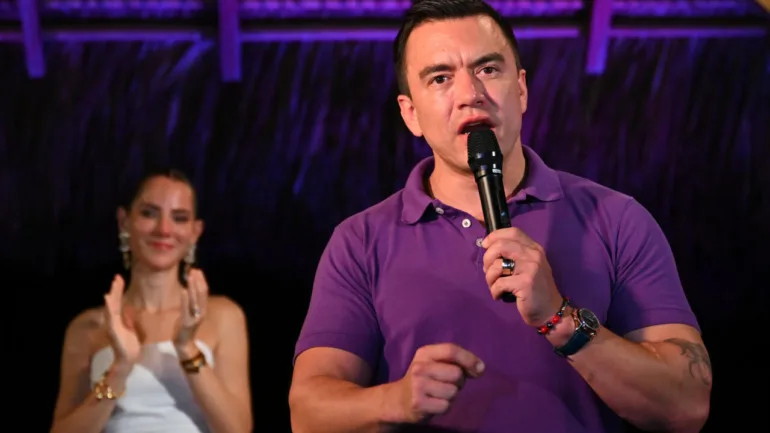Incumbent President Daniel Noboa secured a commanding victory in Ecuador’s presidential election on Sunday, after voters overwhelmingly backed his hardline approach to tackling the country’s surge in cartel-related violence.
With over 90 percent of the ballots counted, the National Electoral Council reported that Noboa held a decisive 12-point lead over his leftist challenger, Luisa Gonzalez, a margin significantly wider than anticipated following their near tie in the first round.
Official results showed Noboa winning 56 percent of the vote to Gonzalez’s 44 percent, handing the 37-year-old a strong mandate to continue his “iron fist” policies against organized crime.
Speaking to cheering supporters in his hometown of Olon, Noboa celebrated what he called a “historic victory.”
“A huge hug to all those Ecuadorians who always believed in this young president!” he declared. “Ecuadorians have spoken. From tomorrow morning, we get to work.”
Gonzalez alleges fraud
Gonzalez, seemingly stunned by the scale of her defeat — and the likely end of her bid to become Ecuador’s first female president — swiftly rejected the outcome, alleging electoral misconduct.
“I refuse to believe the people prefer lies over the truth,” she said, accusing Noboa of orchestrating “the most grotesque electoral fraud” and calling for a full recount.
She did not immediately present any evidence to support her claims.
A country on edge
This election unfolded under the shadow of escalating violence and economic uncertainty. Once considered one of Latin America’s safest countries, Ecuador now holds the grim distinction of being the region’s most violent, with homicides averaging one per hour earlier this year as criminal groups battle for control of drug trafficking routes.
Noboa — a guitar-playing, U.S.-educated son of a billionaire banana magnate — has built his presidency on aggressive security tactics. Since taking office, he has:
- Deployed military forces to the streets,
- Captured prominent cartel leaders,
- Invited U.S. special forces to assist in crime-fighting efforts,
- Declared multiple states of emergency, including a fresh 60-day declaration in Quito and several provinces just ahead of the election.
The surge in bloodshed has shaken investor confidence, slowed tourism, and pushed poverty levels to 28 percent of the population.
Despite the tensions, voter turnout remained high. Roughly 13.7 million Ecuadorians were eligible to vote. In the high-altitude capital Quito, residents braved the Andean cold to cast their ballots.
“I think Ecuador is divided,” said Camila Medina, a 21-year-old architecture student. “But we all understand that we need to unite, no matter who is leading the government.”
What comes next
Noboa’s resounding win is expected to embolden his administration to double down on its security-first agenda and deepen ties with allies, including former U.S. President Donald Trump, with whom he has cultivated a friendly relationship.
“These next four years, I hope everything goes well,” said Natalie Ulloa, 26, a Noboa supporter. “I hope he can finally deliver on what he’s promised from the start.”
Political analysts suggest that Gonzalez’s association with former President Rafael Correa, a controversial figure who now lives in exile in Belgium after a corruption conviction, may have undermined her campaign.
“There’s a strong anti-Correa sentiment,” noted Ruth Hidalgo, a political scientist at the University of the Americas. “Her campaign didn’t manage to overcome that connection, they didn’t convince the electorate, and they failed to build a strong emotional connection with voters — this is the result.”
As Noboa prepares for a new term, Ecuador stands at a crossroads — torn between fear and hope, security and freedom — with a young leader determined to restore stability at any cost.
AFP


